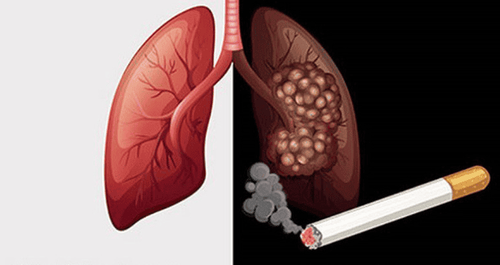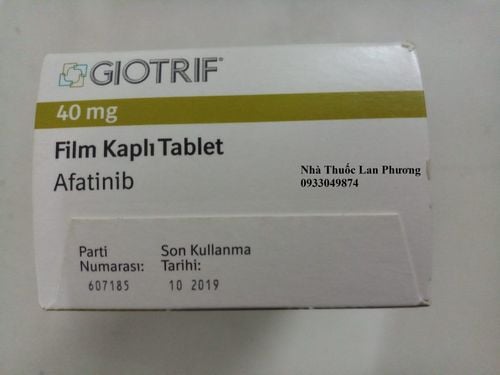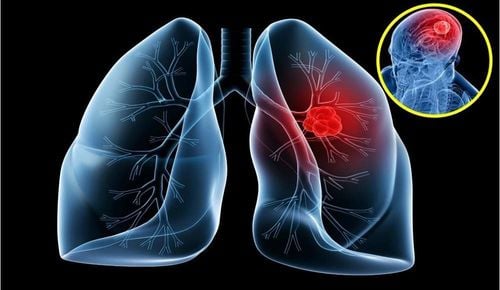This is an automatically translated article.
The article is written by Master, Doctor Mai Vien Phuong - Head of Department of Gastrointestinal Endoscopy - Department of Medical Examination & Internal Medicine - Vinmec Central Park International General HospitalStage 4 lung cancer is considered a late stage, at which point the treatment will become difficult and very expensive. So what do patients need to know when they have terminal lung cancer?
1. What is stage 4 lung cancer?
Stage 4 lung cancer is the most advanced stage of lung cancer. In stage 4, the cancer has spread (metastasized) to both lungs, the area around the lung, or distant organs. According to the National Cancer Institute (NCI), 57% of lung and bronchial cancers are diagnosed at this late stage.
Lung and bronchial cancer is the second most commonly diagnosed cancer, after breast cancer. The disease accounts for about 13.5% of all new cancers, with an estimated 234,000 new cases in the United States in 2018.
If you or a loved one received a stage 4 lung cancer diagnosis, you'll want to know what what will happen to get the best possible treatment.
Expecting support organizations during treatment Along with communicating with family and friends, consider joining a support group or seeking out a therapist or counselor. desired lung cancer patient.
Expect to take responsibility for your health care decisions Many people are motivated to do research from reliable sources and then discuss the findings with their healthcare team. One area for research could be available clinical trials. These can help you access new treatments that can improve your prognosis.
Expect lifestyle changes Many people support treatment by stopping unhealthy habits like smoking and adopting healthy habits like staying physically active and eating right.

Dừng thói quen hút thuốc với người bệnh ung thư phổi giai đoạn 4
Expect palliative care Many lung cancer treatments have unpleasant or associated side effects. Sometimes treatment can be adjusted. Often, your health care team can refer you to a palliative care specialist who focuses on managing side effects. Even if you have completed initial treatment, there will be side effects. follow-up visits, including tests to monitor your recovery.
2. What is the survival rate for stage 4 lung cancer?
The problem, how long does terminal lung cancer live? It's always something a lot of cancer patients want to know. The 5-year lung cancer survival rate measures how many people are living for 5 years after they are diagnosed with lung cancer. The five-year relative survival rate for stage 4 lung cancer is 4.7%.However, the relative survival rates do not take into account recent improvements in treatment. They are based on diagnosis and treatment of at least 5 years prior. Remember, survival rates are estimates only, and everyone's body responds to disease and treatment differently.
If you have been diagnosed with stage 4 lung cancer, many factors will affect your life expectancy, including:
Your general health. Usually, if you're healthy when you're diagnosed with stage 4 lung cancer, it's a sign that you may be better able to tolerate life-prolonging treatments. Age. Although data on outcomes for older adults with lung cancer is limited, a small portion of the 2013 study found that older age was associated with poorer lung cancer survival. Sex. According to the American Cancer Society (ACS), a woman's risk of developing lung cancer at some point in her life is about 1 in 17, while for men, the risk is about 1 in 115. Races. The ACS also indicates that while black women are 10 percent less likely to develop lung cancer than white women, black women are about 20 percent more likely to develop lung cancer than whites. white. Response to treatment. If your body responds well to cancer treatment, you have a better chance of survival.
3. What can be expected when it comes to late stage lung cancer?
Often at this stage, your health care team focuses on palliative care rather than curative care. End-stage lung cancer can cause symptoms such as:Fatigue: This can include physical, emotional and mental fatigue. Emotional changes: Some people find that they become less interested in things they used to care about. Pain. Severe pain and discomfort can occur, but your health care team can help you manage your pain to improve your quality of life.

Người bệnh ung thư phổi giai đoạn 4 thường thấy đau đớn
Shortness of breath : Shortness of breath and shortness of breath are not uncommon. You can learn poses and techniques to help with breathing, and your healthcare team can recommend medication to relax your breathing and reduce anxiety. Dry cough: A persistent cough may be caused by a tumor blocking the airway. Your health care team can develop a treatment plan to relieve and control coughing. Bleeding: If the tumor metastasizes into the large airways, it can cause bleeding. Your doctor may recommend radiation treatment or another procedure. Changes in appetite: Fatigue, irritability, and some medications can reduce appetite. You may find that food is no longer appetizing and you seem to feel full faster. Ideally, for cancer patients, in addition to maintaining the diet, sleeping, and treatment according to the doctor's advice, the patient should also keep a comfortable spirit. Minimize stress, if you need help with any problem, you can discuss it with your loved one or treating doctor.
Vinmec International General Hospital is currently applying immunotherapy in the treatment of lung cancer. Lung cancer treatment with immunotherapy uses drugs that target the immune pathway, enhancing the ability to recognize and kill cancer cells for patients with non-small cell lung cancer. The results of many studies show that immunotherapy significantly improves survival in patients with lung cancer. Patients treated with immunotherapy also experienced fewer side effects than those treated with chemotherapy.
In addition to immunotherapy, Vinmec Hospital also applies autologous immune system strengthening therapy. This method strengthens the immune cells in the patient's body to destroy cancer cells or prevent the cancer from coming back. Using immune factors to treat cancer is the most advanced method in the world today. Vinmec has updated research on using drugs by immune mechanism to improve quality of life and prolong life for lung cancer patients.
Please dial HOTLINE for more information or register for an appointment HERE. Download MyVinmec app to make appointments faster and to manage your bookings easily.
ReferencesThe American Cancer Society medical and editorial content team. (2016). Physical symptoms in the last 2 to 3 months of life. cancer.org/treatment/end-of-life-care/earing-the-end-of-life/physical-symptoms.html Campling B. (2017). What to expect in the end stage lung cancer. oncolink.org/frequently-asked-questions/cancers/lung/general-concerns/what-to-expect-in-end-stage-lung-cancer Mayo Clinic Staff. (2018). Pancreatic cancer – Symptoms and causes. mayoclinic.org/diseases-conditions/pancreatic-cancer/symptoms-causes/syc-20355421 Lung and bronchus cancer – Cancer stat facts. (n.d.). seer.cancer.gov/statfacts/html/lungb.html Puchalski CM. (2012). Spirituality in the cancer trajectory. doi.org/10.1093/annonc/mds088













